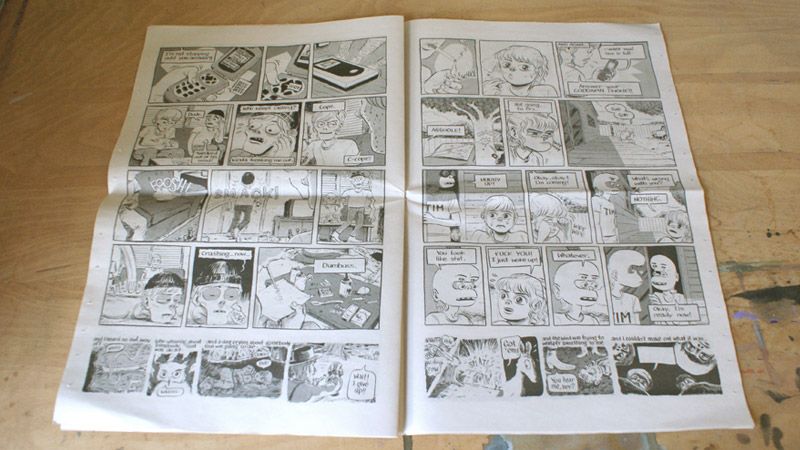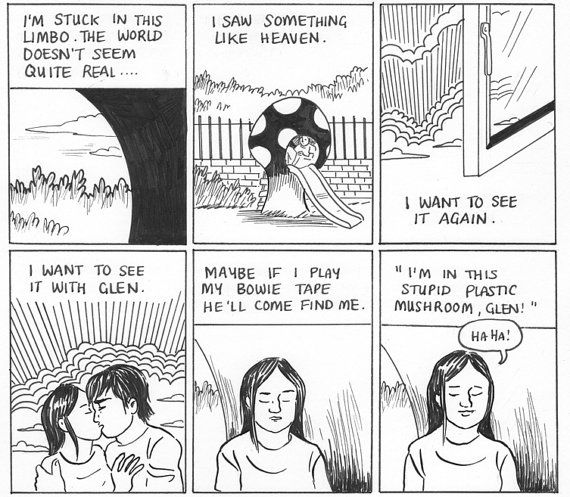Deep in the Woods by Noah Van Sciver and Nicholas Breutzman (2D Cloud, $6).
Is Noah Van Sciver the finest cartoonist of his generation? It certainly seems like he's on the path to earn that title, as readers of The Hypo and his contribution to Alternative Comics #4 will attest. Van Sciver further underscores his considerable talent in Deep in the Woods, a two-man anthology published on newspaper. Van Sciver's original (I'm assuming) fairy tale involves a hapless and poor young maiden who flees her evil stepmother and alcoholic father only to come across a supernatural benefactor in the shape of a floating cow's head. The temptation to let the story delve into parody or slapstick must have been tremendous, especially during sequences like the one where the girl, Robin, attempts to feed the cow, only to have the stew slop out the back of its head. But Van Sciver plays it deadly straight here, keeping the comedy at a far, buried distance (though not so buried that it's completely undetectable). Filling his pages with suffocating black ink, often in the form of nefarious tree branches that threaten to engulf the protagonists, Van Sciver has created a decidedly claustrophobic, downbeat fairy tale that is no less magical due to the storytelling craft on display.
Nic Breutzman is someone I'm less familiar with, or rather, I should say I'm not that familiar with his work at all. I like his contribution here though, a somewhat more modern tale involving a poor, meth-taking family, the level-headed young girl that serves as our protagonist, a grandfather who won't come out of a well and a nefarious creature that lives in a hollow tree. I'm all about stories that place archetypical folk structures and place them in a modern setting and Breutzman does that well enough here that I'm going to keep an eye out for what he does next time.
Sky in Stereo #2 by Mardou (Yam Books, $6).
Comics about young, aimless twenty-somethings coming of age are a dime a dozen, but this particular book is something special. The plot concerns a young college student named Iris who undergoes a lengthy acid trip and experiences the expected grand highs and depressing lows. Except for a few early transcendental sequences, Mardou tries to avoid trying to depict Iris' view of reality or indulge in some Brendan McCarthy-styled surrealism. Indeed, she mostly adheres to a strict nine-panel format, keeping Iris in mid-view and letting us in on her thoughts via text alone.
That sounds like the making of a deadly dull comic, but Sky in Stereo is anything but. Mardou captures Iris' angst, longing and lack of self-confidence exceedingly well. She has a great ear for dialogue and the way people can get lost in their own thoughts, especially when on drugs. The comic is filled with a lot of nice details, like the hostility between the main character and her stepfather, the way she interacts with her well-meaning but basically hapless mother, or the crush she carries for a co-worker. None of this is played to the rafters or overdone. This is one sharply observed, well-written comic.
Journal by Julie Delporte (Koyama Press, $20).
Perhaps even more mundane than the bildungsroman comic is the diary comic. I've seen and heard a number of complaints from certain readers about how too many young cartoonists detailing or over-explaining every aspect of their lives (or other subject) when they don't necessarily have a lot of life experience to draw from. Not so with Delporte's Journal. The first thing in her favor here is her extraordinary use of color. Relying on what I assume are colored pencils, she fills her pages with bright, almost glowing reds, yellows and and blues, capturing in an almost hurried, snapshot-fashion whatever seems to be in front of her eyes at the moment. The second thing is the subject. Covering the period between February 2011 and October 2012, Journal is basically Delporte chronicling the end and subsequent mourning of a romantic relationship. Delporte wisely doesn't delve into details -- we don't know exactly what went wrong, but Delporte is able to convey her sense of loss and pain without delving into maudlin sentimentality, a talent that should be treasured and touted whenever it rears its head.



